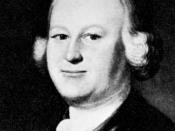Wikipedia.org defines the exclusionary rule as "A legal principle holding that evidence collected or analyzed in violation of the United States Constitution is inadmissible for a criminal prosecution in a court of law." In early years in the United States there were no such things as search warrants as we know them today, back then they had a document called "Writ of Assistance" which was kind of a general search warrant which did not specify the search or seizure of a specific person, place, or property; these documents did not have an expiration date and were even transferable from holder to holder. With so much power deposited in the individuals who held these Writs of Assistance, they felt they were above the law, and sometimes they actually were, because they could search and seize anything or anyone for no specific reason whatsoever. These early practices created a precedence that was taken into consideration later in history during the drafting of the Bill of Rights.
The fourth amendment of the United States Constitution offers protection against unreasonable searches and seizures. The fourth amendment states that no warrants would be issue but only upon probable cause, which is a term used to establish the reasonable belief that a crime has occurred or is about to take place. ("Exclusionary Rule")
It could be said that the exclusionary rule itself is part of the fourth amendment of the United States Constitution; however, it was not until 1914 that it was created and this was in the case Weeks V. United States. Until 1913, the rules and procedures by which evidence was collected derived from early English common law and it was said that the way the evidence was obtained had little to do with its admissibility in a court of law. Before Weeks...



Definition
Rather than using a wikipedia definition it might be better to use a Dictionary like Webster's. A good job as a whole though.
0 out of 0 people found this comment useful.